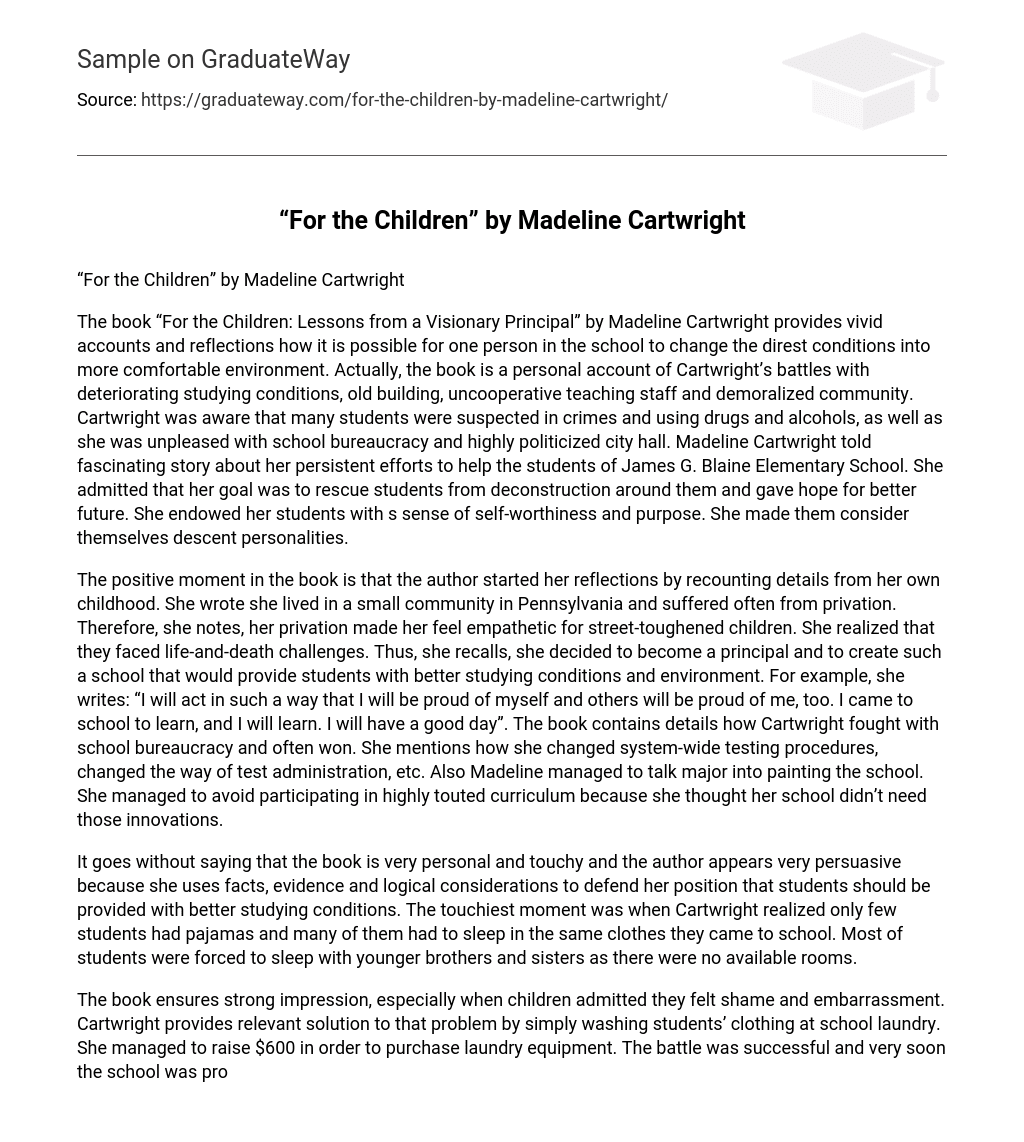The book “For the Children: Lessons from a Visionary Principal” by Madeline Cartwright provides vivid accounts and reflections how it is possible for one person in the school to change the direst conditions into more comfortable environment. Actually, the book is a personal account of Cartwright’s battles with deteriorating studying conditions, old building, uncooperative teaching staff and demoralized community. Cartwright was aware that many students were suspected in crimes and using drugs and alcohols, as well as she was unpleased with school bureaucracy and highly politicized city hall. Madeline Cartwright told fascinating story about her persistent efforts to help the students of James G. Blaine Elementary School. She admitted that her goal was to rescue students from deconstruction around them and gave hope for better future. She endowed her students with s sense of self-worthiness and purpose. She made them consider themselves descent personalities.
The positive moment in the book is that the author started her reflections by recounting details from her own childhood. She wrote she lived in a small community in Pennsylvania and suffered often from privation. Therefore, she notes, her privation made her feel empathetic for street-toughened children. She realized that they faced life-and-death challenges. Thus, she recalls, she decided to become a principal and to create such a school that would provide students with better studying conditions and environment. For example, she writes: “I will act in such a way that I will be proud of myself and others will be proud of me, too. I came to school to learn, and I will learn. I will have a good day”. The book contains details how Cartwright fought with school bureaucracy and often won. She mentions how she changed system-wide testing procedures, changed the way of test administration, etc. Also Madeline managed to talk major into painting the school. She managed to avoid participating in highly touted curriculum because she thought her school didn’t need those innovations.
It goes without saying that the book is very personal and touchy and the author appears very persuasive because she uses facts, evidence and logical considerations to defend her position that students should be provided with better studying conditions. The touchiest moment was when Cartwright realized only few students had pajamas and many of them had to sleep in the same clothes they came to school. Most of students were forced to sleep with younger brothers and sisters as there were no available rooms.
The book ensures strong impression, especially when children admitted they felt shame and embarrassment. Cartwright provides relevant solution to that problem by simply washing students’ clothing at school laundry. She managed to raise $600 in order to purchase laundry equipment. The battle was successful and very soon the school was provided with laundry room in order to make children’s clothes neat and clean. She was full of enthusiasm and soon many other teachers were involved in improving process.
Most of the students suffered from material poverty and, though Cartwright worked in one of the poorest neighborhoods in Philadelphia, she managed to provide her students with fine clothes and nice cars. For example, she claimed that “she always felt she deserved the accoutrements of success”. Nevertheless, she realized that her efforts could lead to antagonism of community people. However, students and their parents did their best to protect her. It is necessary to admit that Cartwright defined herself as “office principal”. She was extremely visible principal and was engaged in “management by walking around”. One of the most important moments is that she worked out a system of rewarding and rebuking teachers and students.
Summing up, no person can remain indifferent after reading the book. The author teaches how to survive and remain humane in the direst conditions. On her own example she showed that everything was possible and everybody deserved success and better future. She taught students to struggle and never to give up.
Works Cited
Cartwright, Madeline. For the Children: Lessons from a Visionary Principal. USA: Double Day, 2001.





